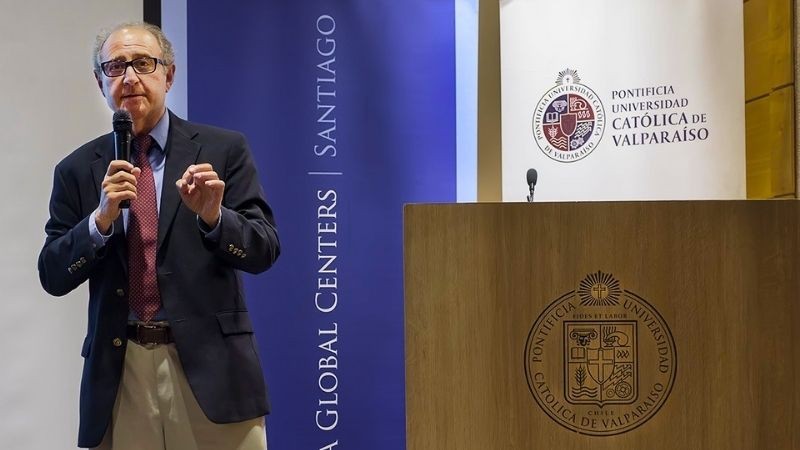A riveting account of the months before and after Stalin’s death in March of 1953 was the focus of the last lecture of the series on the 100 years of the Russian Revolution organized by the Santiago Center in association with three local universities. The presentation included a tale of the plotting by Beria, Malenkov, Khrushchev and other “comrades in arms” to take power after the dictator’s passing as well as of the failure of President Dwight Eisenhower and Secretary of State John Foster Dulles to match the Kremlin’s conciliatory gestures.
The lecture was delivered by Joshua Rubenstein, a historian, international relations expert and human rights activist who has researched and written extensively on the Soviet Union and the Holocaust. A long-time Associate of the Davis Center for Russian and Eurasian Studies at Harvard University, he is the author of “Soviet Dissidents: Their Struggle for Human Rights” and “Tangled Loyalties: The Life and Times of Ilya Ehrenburg,” a biography of the controversial Soviet-Jewish writer and journalist. “The Last Days of Stalin” is his tenth book.
For this series of lectures, the Santiago Center teamed up with Universidad Católica de Valparaíso, Universidad de Chile, and Universidad Católica de Chile. From September 2017 to January 2018, scholars from various disciplines addressed different aspects of this major uprising, including Columbia’s Catherine Evtuhov, a specialist in the history of Russia, who gave a talk in November entitled "Was there a Revolution in 1917? A view from Russia's Imperial Period". She focused on the political and social implications of the Revolution of 1904-07, which erupted in the wake of war with Japan.
In addition to Evtuhov’s presentation, scholars spoke about the Russian Revolution in the context of other major political and social rebellions, its impact in Latin America, and the role of the Red Army in the Second World War. The Santiago Center organized a session on Anna Akhmatova (1889-1966), who is considered one of the greatest Russian poets. In mid-October, Wellesley College’s Marjorie Agosin – also a poet, human rights activist, and literary critic—read some of Ahmatova’s poems, discussed her initial work as well as that of the Stalin years, talked about her turbulent personal life and presented the documentary “Fear and the Muse: The Story of Anna Akhmatova” (Jill Janows, 1991).
Photographs courtesy of Luis Sanhueza.

